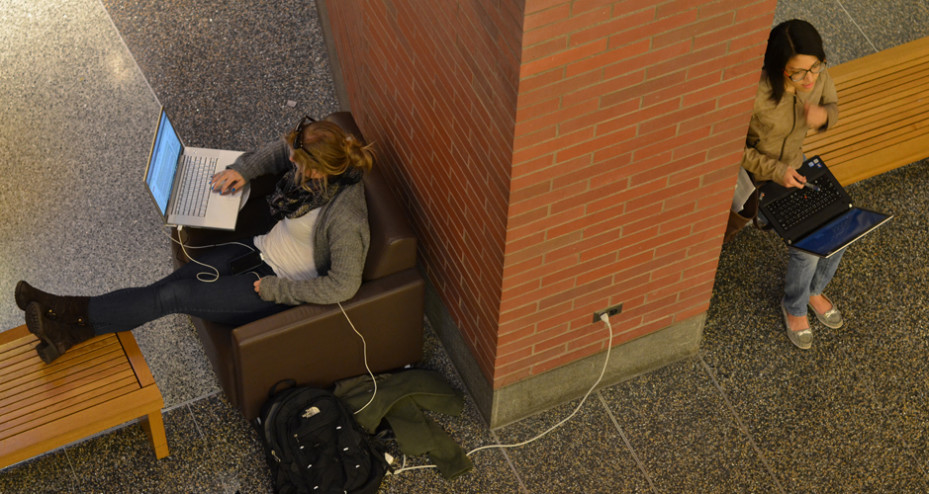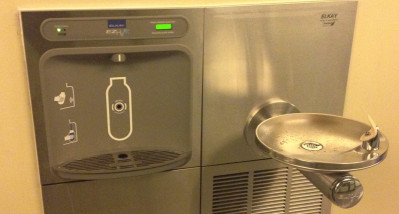Wharton strives to save energy, resources, and money, but some of the most effective changes come through the efforts of faculty, staff, and students.

Turn off computers at night, weekends and vacations.
Leaving your computer on overnight wastes about $90 in energy per computer per year. Penn has 20,000 staff and faculty members, so turning off your computer when you leave the office, over the weekend and during vacations makes a real difference. Check with your IT support staff to coordinate remote connections and updates. All Wharton staff and faculty are officially encouraged to shut down computers.

Save water! Use sinks with sensors.
Sinks with automatic sensors use, on average, 20% less water than a manual sink. If you have the option, go for the sink with sensors.
Double-sided printing saves trees, toxins and waste.
Print course work, class notes and anything else you print on both sides of the paper. Wharton’s Huntsman Hall has a double-sided default, but if you’re printing from your own laptop, from an office computer or at home, hit Print, then Properties and look for the setting marked “Duplex”. Wharton saves tens of thousands of dollars and over 200 trees per year with double-sided printing.
Don’t trash e-waste!
E-waste includes electronics, big and small, from computers and printers to cell phones, iPods and batteries. Some of these items contain lead, cadmium, beryllium, mercury and more – all of which can be dangerous to public health when disposed of improperly or irresponsibly. At Wharton, drop your e-waste in a TechnoTrash bin in your department or near the Wharton Computing Customer Support Center.
Reduce and Recycle Junk Mail
Tired of all those catalogs, unwanted magazines, flyers, advertisements and junk mail? When you get it, be sure to recycle it, but also consider reducing it. Around 100 million trees and 28 billion gallons of water are used to send junk mail to Americans every year. Advertise student activities via email, setting up a table in gathering areas, or hanging a few flyers from the cork strips available in many classrooms. Stop 75% of unsolicited mail by registering on the Mail Preference Service on the Direct Marketing Association website (for a fee of $1).
Recycle Plastics #1-7 Now at Penn!
Penn now recycles all plastic containers, thanks to advances in recycling systems at our local center, Blue Mountain Recycling. Look for a number code in a triangular recycling symbol to make sure it’s recyclable. Now including bottle caps, take-out containers, plastic cups and so much more!
Bring your own mug.
All Wharton cafes offer a discount on beverages for bringing your own mug, and you’ll reduce waste from disposable coffee cups as well! Now only $1.19 for a “refill” at all Wharton Au Bon Pains. In 2005, Americans used and discarded 14.4 billion disposable paper cups for hot beverages. If put end-to-end, those cups would circle the earth 55 times.
Bring your own water bottle.
In many Wharton offices, we now have water purification systems. Reduce plastic bottle waste by bringing your own bottle and refilling it throughout the day. Better yet, use one travel mug for both hot and cold beverages. Plastic bottles can be recycled but often end up in waste streams and waterways. To learn more about the North Pacific Ocean’s Plastic Vortex, visit Project Kaisei.
Bring a reusable shopping bag.
Paper or plastic? No thanks! There are all kinds of bags now that roll up into tiny packages so you can carry it with you in your backpack, purse or briefcase. When you shop, think first “do I really need a bag?” and if the answer is yes, pull out your own to protect marine ecosystems. Because plastic bags are so lightweight, they are often carried by the wind out into waterways and never biodegrade.
Take the stairs!
Overnight and over the summer, Huntsman Hall shuts off its escalators to conserve energy. After 11pm year-round and all day during summer months, take the stairs to stay healthy and help us keep our environmental footprint in check.


